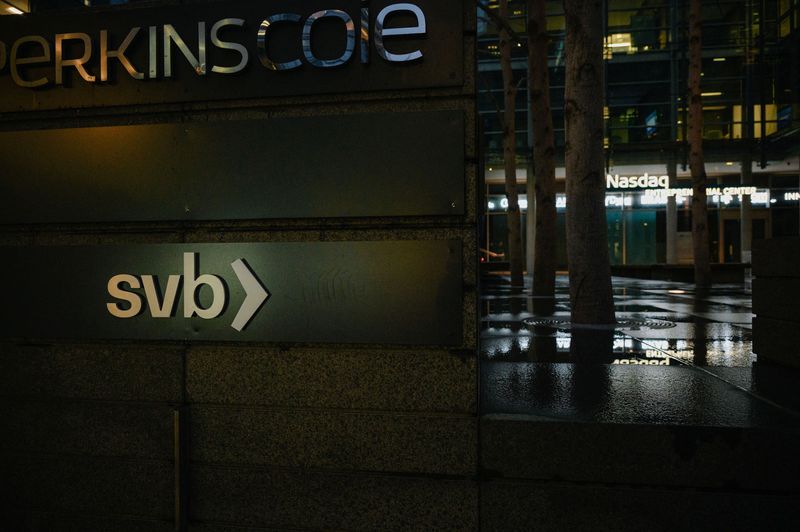U.S. credit default swaps rise on worries about bank failure contagion
2023.03.13 14:26

© Reuters. FILE PHOTO: A view of a logo at the Silicon Valley Bank branch office in downtown San Francisco, California, U.S., March 13, 2023. REUTERS/Kori Suzuki
By Davide Barbuscia and Shankar Ramakrishnan
NEW YORK (Reuters) – An index of credit default swaps (CDS) on U.S. investment-grade companies on Monday hit an intra-day high of 89.6 basis points, its highest since November, as investors worried about contagion risks after the collapse of Silicon Valley Bank (SVB) and New York’s Signature Bank (NASDAQ:) in the space of 72 hours.
Global banking shares plunged as moves by the United States to guarantee deposits at tech-focused lender SVB failed to reassure investors that other banks remain financially sound.
Rising CDS spreads signal investors are hedging bets on a deterioration in credit quality. The equivalent index for CDS on junk-rated companies fell in price to 98.9 on Monday, its lowest since November, according to data from IHS Markit.
Investment grade credit spreads, which indicate the premium investor demand to hold corporate bonds over safer government debt securities, have also been widening – an indication that SVB’s failure last week, the second largest bank failure in U.S. history, sparked broader concerns over whether companies can still fund themselves in a higher interest-rate environment.
Spreads for investment grade bonds widened by about 15 basis points last week “in the worst week for credit spreads since the peak of pandemic stress,” Daniel Krieter, director FI strategy, BMO Capital Markets, said in a report.
In money markets, a closely watched indicator of credit risk in the U.S. banking system edged up on Monday.
With investors worried about possible bank runs, the Federal Reserve on Sunday unveiled a new program to ensure banks can meet needs of all their depositors.
The Bank Term Funding Program should alleviate funding concerns, but it “will not likely stop deposit migration into the largest US depository institutions,” said BMO’s Krieter.
Meanwhile, some bonds issued by Silicon Valley Bank were trading at around 40 cents on the dollar on Monday, down from nearly 90 cents early last week.
“Hedge funds are probably the ones that are buyers in this case,” said Dan Bruzzo, a strategist at Santander (BME:) US Capital Markets.
Other banks with California exposure were taking the brunt of the selloff in the debt capital markets, he added.








